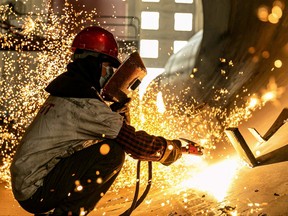風蕭蕭_Frank
以文會友弗蘭克·斯特羅納克:製造業的萎縮讓加拿大變得虛弱
https://nationalpost.com/opinion/the-gutting-of-our-manufacturing-industries-has-made-canada-weak
當我們不再能夠生產新型戰鬥機或潛艇的高科技部件時,誰來為我們生產?俄羅斯?還是中國?
作者:弗蘭克·斯特羅納克 2024年5月28日
中國製造業 2021年,一名工人在中國南通的一家工廠生產出口工程設備。圖片來源:STR/AFP
文章內容
“中國製造”:這是你在全國各地商店出售的許多產品上都能看到的標簽。偶爾,你會看到其他國家製造的產品。但你很少看到加拿大製造的產品。
當我們還是製造業強國時,我們的生活水平令世界羨慕。如今,隨著製造業的萎縮,我們的生活水平也在下降。
而中國,則是一個快速崛起的經濟和軍事超級大國。中國人過去常常從其他國家購買戰鬥機和航空母艦。現在,他們大多自主製造。
早在20世紀90年代和21世紀初,經濟學家們就曾盛傳,像加拿大和美國這樣的發達經濟體不再需要製造產品。他們認為,這項工作可以外包到成本更低的國家。
相反,他們聲稱我們應該專注於通過軟件和知識經濟創造財富——那些不需要實物投入或鋼鐵、塑料等材料的產品和服務。
據專家稱,我們最終都會成為高技能的知識工作者,能夠開發軟件和處理數據,而且我們的境況會好得多,不再需要親手從地下挖掘礦物,也不再需要在工廠的流水線上辛苦勞作。
我從未認同這種想法——這不僅僅是因為我在所謂的“舊經濟”製造業工作過。對我來說,一個放棄製造業的國家注定會落後和衰落。
凱利·麥克帕蘭:我拒絕從中國購買商品的一年
凱利·麥克帕蘭:賈斯汀·特魯多幼稚的電動汽車計劃將鑰匙拱手讓給了中國
多年來,我們越來越少地專注於創造真正的財富,而是越來越多地參與轉移和重新分配我們創造的、正在減少的財富的過程。結果,我們慢慢地放棄了農場和工廠,如今我們購買的許多產品和消費的食品都依賴於進口。
放棄製造業的後果是嚴重而深遠的。製造能力的下降將導致國家技術基礎和技術訣竅的衰退。
製造業及其供應基地共同開發了種類繁多的技術和產品——從精密的電子產品到新型複合金屬和塑料,應有盡有。例如,在我擔任麥格納國際董事長期間,我們與蘋果公司合作開發了iPhone的觸摸屏玻璃技術,這是我們核心汽車業務的衍生產品。
製造業孵化的技術不僅應用於各行各業,也應用於國防工業,這對於維護我們的自由和世界各地的民主至關重要。
兩年前,英國皇家聯合服務研究所發表了一篇令人大開眼界的文章,提出了一個問題:“西方還能提供民主的武器庫嗎?” 其結論是響亮的“不能”。我們不僅不再擁有像俄羅斯和烏克蘭那樣進行粗暴戰爭的製造能力,而且還在失去生產先進新型武器的能力。
當我們不再能夠製造新型戰鬥機或潛艇的高科技部件時,誰來為我們製造它們?俄羅斯?還是中國?
歸根結底,北美和歐洲製造業的持續衰退將影響包括國防在內的眾多其他行業,並將使我們失去一個主要的技術創新引擎。
為了阻止這種侵蝕,我們首先需要努力恢複我們的技術技能基礎。這意味著通過在各省建立專注於從采礦業到製造業等各個行業的技術貿易中心,在加拿大各地培訓數十萬名技術熟練的技工。
技術技能將為我們重建製造業、振興經濟和恢複繁榮奠定基礎。
如果我們不保護和培育我們的製造業基礎,那麽多年以後,我們就會問自己:中國是如何變得如此強大的?我們真正應該問的問題是:為什麽我們袖手旁觀,看著那些最初讓我們繁榮起來的行業分崩離析?
弗蘭克·斯特羅納克是加拿大最大的跨國公司之一麥格納國際公司的創始人,斯特羅納克經濟權利基金會。
Frank Stronach: The gutting of our manufacturing industries has made Canada weak
https://nationalpost.com/opinion/the-gutting-of-our-manufacturing-industries-has-made-canada-weak
When we’re no longer able to manufacture the high-tech components for new fighter jets or submarines, who is going to make them for us? Russia? China?
By Frank Stronach May 28, 2024
 A worker produces engineering equipment for export at a factory in Nantong, China, in 2021. PHOTO BY STR/AFP
A worker produces engineering equipment for export at a factory in Nantong, China, in 2021. PHOTO BY STR/AFPMade in China: it’s the label you see on many products sold in stores throughout the country. The odd time, you’ll see a product manufactured in some other country. But you rarely see a product that’s made here in Canada.
Over the years, we’ve become less and less preoccupied with creating real wealth, and more and more engaged in the process of transferring and redistributing the declining wealth that we do generate. As a result, we’ve slowly abandoned our farms and factories and today import many of the products we buy and the food we consume.
The consequences of relinquishing our manufacturing sector are serious and far-reaching. A decline in manufacturing capability will lead to a decline in the country’s technology base and technical know-how.
The manufacturing industry and its supply base jointly develop a vast array of technologies and products — everything from sophisticated electronics to new composite metals and plastics. For example, when I was chair of Magna International, we joined forces with Apple to develop the touch-screen glass technology for the iPhone, a spin-off product that arose from our core automotive business.
The technologies incubated in the manufacturing sector have applications not only in a wide range of industries but also in the defence industry, which is vital for safeguarding our freedom and the protection of democracies around the world.
There was an eye-opening article published by the Royal United Services Institute in the United Kingdom two years ago, which asked the question: “Can the West still provide the arsenal of democracy?” Its conclusion was a resounding “no.” Not only do we no longer have the manufacturing capacity to fight a crude war like the one Russia and Ukraine are engaged in, we’re also losing the ability to produce advanced new weapons.
When we’re no longer able to manufacture the high-tech components for new fighter jets or submarines, who is going to make them for us? Russia? China?
At the end of the day, the continued deterioration of the manufacturing sector in North America and Europe will impact a wide range of other industries, including defence, and it will rob us of one of our chief engines of technological innovation.
To halt this erosion, we need to first work on restoring our technical skills base. That means training hundreds of thousands of skilled tradespeople across Canada through the creation of technical trade centres in every province focused on every industry from mining to manufacturing.
Technical skills will give us the foundation to rebuild our manufacturing industry, revitalize our economy and restore our prosperity.
If we don’t protect and foster our manufacturing base, then years from now, we will be asking ourselves: how did China become so strong? The real question we should ask is: why did we stand idly by and watch the dismantling of the industries that made us prosperous in the first place?
Frank Stronach is the founder of Magna International Inc., one of Canada’s largest global companies, and the Stronach Foundation for Economic Rights.




